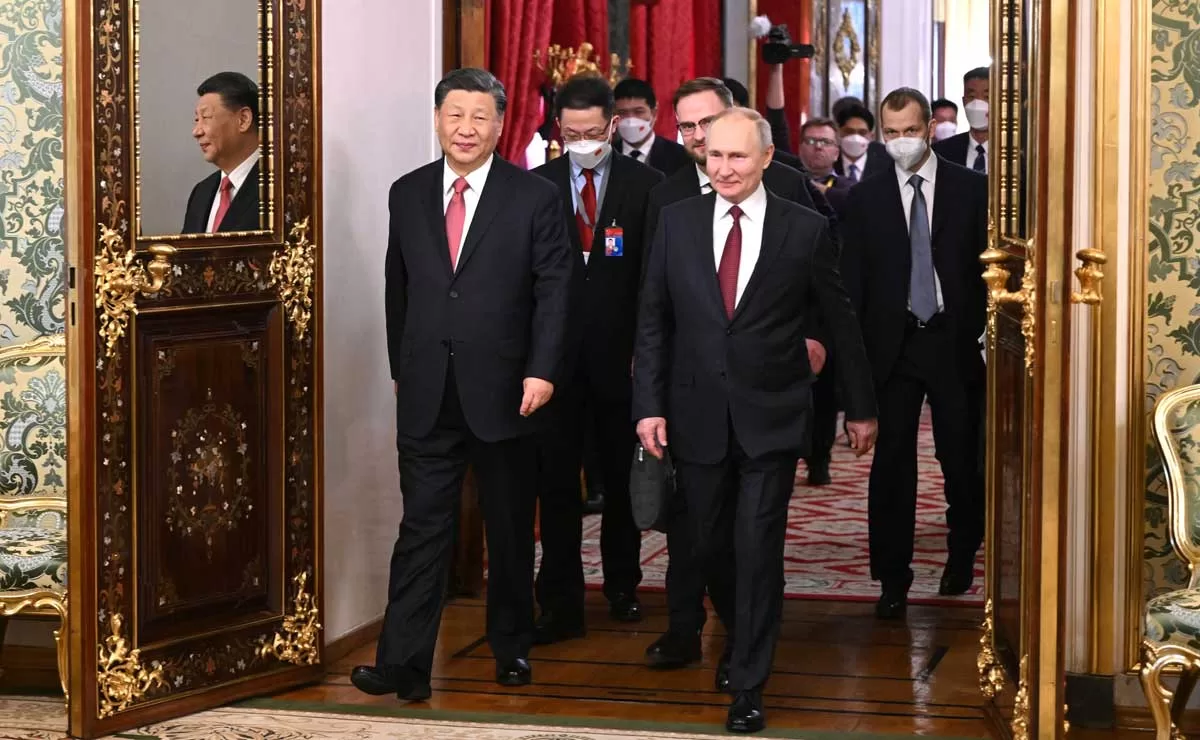In Putin, it has a devout conduit.
Right now Russia, China, and Iran are forming a coalition to contest the American-led global order. In some theaters like Ukraine, bombs are deployed to herald its arrival. Elsewhere, it is more sinister.
In the South Caucasus, Putin is quietly maneuvering – seeking to reclaim Russia’s imperial fragments and fatally extinguish Europe’s waning influence in the region.
In Georgia, its billionaire prime minister with Kremlin ties, recently overturned a presidential veto to pass Russian-inspired media regulation, dubbed the “Russian law.” Meanwhile, neighboring Armenia seeks more substantial ties with the West, dislodging itself from Russia’s yoke.
The responses to these developments differ markedly: opponents of Georgia’s law faced police brutality and were snatched without a trace, while those criticizing Armenia’s westward shift were not only free to voice their dissent, but were bolstered with Russia’s support.
Former NATO Secretary-General Rasmussen called for Europe to rapidly scape up its support for Armenia, but that call hasn’t been answered.
Europe cannot sit idly by. It must swiftly empower regional pro-European forces or witness Russia redrawing imperial borders, step by step.
There is a more subtle game at play as Georgia is set to become a haven for sanctioned Russian oligarchs, rubbishing European sanctions, potentially in return for a reintegration of its Russian-backed breakaway statelets into Georgia proper, with Russia’s acquiescence.
Reasserting control over Abkhazia and South Ossetia remains a central goal of Georgia’s ruling party, which kept them in power for over a decade. Recent polls show this issue is more important for Georgians than joining the EU.
But while the Kremlin wrestles for control, China, meanwhile, gains ground in Georgia. Georgia awarded a lucrative contract to develop a strategic deep-sea port in the Black Sea to Chinese firms, after initially awarding it to an American led-consortium, boosting China’s control over data-rich underwater cables beyond the South China Sea.
This move coincides with China’s ongoing military stand-off with America in the South China Sea. Last year, China’s Ministry of Natural Resources published a map laying claim to vast areas belonging to the Philippines, Malaysia, Indonesia, and Vietnam.
The waters around Malaysia’s oil-rich Sabah region operated by its national oil company Petronas were included in China’s claims, further contesting a region that a long-lost clan based in the Philippines – the Sulu Sultanate – also lays claims to with $20m financial backing from British litigation funder Therium.
The Sulu’s $15bn claim led to a string of enforcement actions against Petronas. However, the criminal conviction of the Spanish arbitrator, Dr Gonzalo Stampa, who presided over the mammoth award granted to the claimants last December has cast doubt on the whole proceedings. So too was the “unusually high fee” of $2.7 million that Stampa was paid as arbitrator. No wonder that last March, Petronas moved to seek disclosure of documents via a court in Manhattan to seek out any evidence of “money transfers”, “payments” or “communications” between Therium and “anyone who may have conspired” with Stampa.
The situation underscores the potential for litigation to serve as a geopolitical tool that alienates allies as much as it can weaken adversaries.
With China’s approach, there is an explicit play made on vast natural resources through intimidation and subsequent bargaining, while America’s dotted line to funding the Sulu Case risks alienating Malaysia – a traditionally neutral state an increasingly polarized world – towards these bargains.
Revealingly, former NATO analyst Maurizio Geri reports that the Sulu claimant’s English barrister is Paul Cohen, a former Clinton-Gore presidential campaign speechwriter who heads up the Silicon Valley Arbitration & Mediation Center, where he works closely with US tech giants who compete for control with China over deep-sea cables that carry 99% of the world’s internet traffic.
In many ways, the geopolitical dynamics surrounding Malaysia’s Sabah region echo the complexities seen in Georgia’s breakaway territories.
One thing is certain. Europe will lose these ‘secret wars’ if being within the Russian-Chinese-Iranian sphere of collective influence outweighs partnerships with the West that are built on freedom and democracy.
To combat these developments, the EU must first reform its institutions and cut the bureaucratic red tape in order accelerate both Armenia’s membership bid and repivot Georgia towards Western institutions.
This recasts the Western offer of a more prosperous, peaceful, and integrated future.
To emphasize it further, Russia’s intermediaries must feel more pressure through broader sanctions that unspin Putin’s web.
Secondly, Europe must subject its growing energy-focused relationship with Azerbaijan to the same interrogation as its collapsing one with Russia.
This dysfunction and political incoherence is no longer the domain of fringe commentary: the proof is Azerbaijan’s Aliyev is forging deeper economic ties with Putin amid $4bn trade, rendering Europe energy-dependent on a key Russian partner.
That is why these threats all weave together to support one last imperative: Europe must arm itself well beyond 2% NATO commitments, because its security hinges on its ability to exert overwhelming force, not simply analyze it.
If Putin continues to mobilize the South Caucuses back towards a reimagined Soviet Union unchecked, Russia’s trilateral relationship with Iran and China will usher in a new age of tyranny Europe is catastrophically unprepared for.
